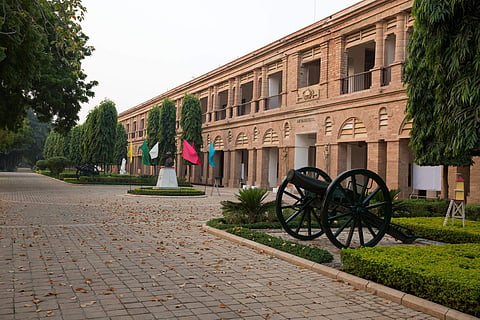

With an aim to become a pre-eminent centre of learning in the country, The Scindia School, a boarding school for boys, aims to extend learning beyond classrooms for students and produce future leaders. Established in the magnificent Gwalior Fort, the school has a modern touch to it. The school has even been ranked as number one in the category of Boys Boarding by the Education World India School Rankings 2019 survey. We got a chance to interact with Dr Madhav Deo Saraswat, the principal of the school, who spoke to us about the importance of imbibing our culture through education, co-curricular activities and teaching children to be environmentally-conscious citizens.
Here's what transpired:
How is the Scindia school keeping a balance between the modern day amenities and importance of our culture/heritage and inculcating the right learnings among the students?
The higher purpose of education is to develop individuals who can strike a fine balance between their head and the heart and not the mere accumulation of knowledge; this has been our vision ever since inception. An institution must provide a comfortable environment that is congenial to the teaching-learning process, as it is an important dynamic that cannot be ignored. However, it should only be taken as a means to an end. The school possesses state-of-the-art infrastructure on a sprawling 160+ acres of land at the heritage 9th century Gwalior Fort; the outer facade of the school has most definitely undergone refurbishment and renovation from time to time to suit the needs of 21st-century learners while keeping the internal fabric of the school intact. We are of the view that values can’t be taught but are caught from the immediate environment. Therefore our effort is to provide the boys with the right references so that they can imbibe the value of appreciating their culture and heritage naturally. I would like to give credit to my colleagues who have been instrumental in passing the beautiful traditions of the school from one generation to another. Owing to the aforementioned Scindians have always been connected with their roots. The more things change at Scindia, the more they remain the same.
How does the school go beyond academics and hone other skills in students such as sports, art, theatre, music etc?
Education is all-encompassing and a lot of it happens beyond the boundaries of a formal classroom. Therefore in principle we lay equal emphasis on co-curricular activities and sports if not more than academic rigour. The presence of a Dean of Co-curricular Activities, who primarily looks into the effective planning and conduction of the activity programme is testimony to the fact that these engagements are taken up rather seriously at Scindia. 21 sports arenas, 18 disciplines across games, 16 dedicated coaches, 17 clubs and activities to choose from provides a vibrant canvas to Scindians to explore the world beyond the number game.
What are the opportunities and facilities provided by the school to students with disabilities?
Education has to be inclusive, it cannot and should not be limited to a certain set of individuals based on a specific template or our prejudice for that matter. Everyone has its own unique style of learning, therefore we try not to look at specially-abled children through the lens of disability. Everybody brings something to the table; the more diverse a learning community is, the better. In fact, our effort is to help such children identify their niche and shine in their specific areas of interest. This happens via the array of opportunities that are presented before them in the form of experiential learning, interdisciplinary teaching, internships and a highly engaging activity programme, The presence of two full-time special needs educators ensures that these children receive the right intervention and support at the right time.
According to you, what do schools need to do to adapt to the ever-evolving education scenario in the country?
While all the schools have to work within the broad guidelines of the curriculum they are guided by, it is imperative that they use a multi-pronged approach towards education which is student-centric. This would not only ensure that learning is based on natural talent and aptitude rather than the rat race ideology but also in the bargain will develop skills which would be equally if not more important than the accumulation of facts and figures. The content and the delivery of the curriculum has to truly become holistic in nature.
Is the school conducting or advocating anything in terms of saving the environment? Children as young as 16 year-olds are conducting climate strikes, so how important is it to make them aware of the consequences?
"We do not inherit the Earth from our ancestors - we borrow it from our children."
There is indeed a huge gap between what is written in the book and what is actually practiced. To bridge this gap, meaningful and continuous engagement in community development programmes as a way to provide real education to youngsters is the need of the hour. If schools can engage students in tree-plantation, campus-cleaning, water conservation, teaching under-privileged children etc., they will internalise a larger role for themselves in society and they’ll become leaders of change. Also, unless we provide exposure to children to experience those values which are printed in the books, they will never be internalised.
